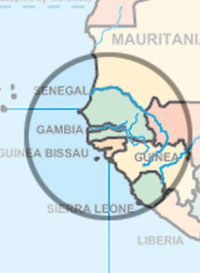Veterinarian served, then led, African nation
Sir Dawda Kairaba Jawara expected to spend his life after college doing what he loved—being a veterinarian.

"There's not a cow in Gambia that doesn't know me personally," he once said.
But fate had a different plan for him.
Convinced that Gambia should become independent of British rule, he abandoned his profession in 1960 to enter politics. This move eventually led to him becoming the nation's first president. Until a military coup in 1994, this veterinary surgeon brought years of stable democracy to Africa's smallest mainland republic.
From cattle to politics
Dr. Jawara was born May 16, 1924, in Gambia, then a British colony. He attended a local Muslim primary school and a Methodist boys' high school in the nation's capital, Bathurst (now Banjul).
He spent a year studying science at Achimoto College in Ghana before being awarded a scholarship to study at the University of Glasgow Faculty of Veterinary Medicine in Scotland. Dr. Jawara was president of the African Students' Union and socialized with African nationalists of the day. He earned his BVSc from Glasgow in 1953.
After his return to Africa, Dr. Jawara worked in the countryside vaccinating cattle as one of his country's only veterinarians. An outbreak of rinderpest soon after gave him a baptism by fire. His success at helping mitigate the spread won him the respect of the colonial authorities, who in January 1957 promoted him to principal veterinary officer of the colony, the highest position an African could aspire to in those days, according to Encyclopedia Britannica.
His entry into politics came in 1959 when he joined the Protectorate People's Party.
At age 35, Dr. Jawara had a number of friends who were influential civil servants running the country. Also, his veterinary work made him well known among the rural population, who were the party's targeted supporters, according to The Gambia Echo, the nation's online newspaper. By December 1959, he was in charge of the organization, which changed its name to the People's Progressive Party. The following year he stepped down from his government post to enter the May elections.
Dr. Jawara was elected to the Gambian House in 1960 and simultaneously served as education minister. With Dr. Jawara's rise to power, the colonial administration began a gradual withdrawal from Gambia, with self-government granted in 1963. Dr. Jawara was appointed prime minister the same year, according to Encyclopedia Britannica.
Trials and tribulations
During this time, Gambians began calling for independence from Britain, which their nearby neighbors Kenya, Ghana, Guinea, and Nigeria had already achieved. Located on the West African coast, Gambia is a 30-mile-wide strip of land surrounded on three sides by Senegal.
Dr. Jawara reached out to the neighboring country's president, Leopold Senghor, to form a coalition that would coordinate defense, foreign affairs, and overseas representation but still guarantee autonomy for both Gambia and Senegal, according to The Gambia Echo.
With a deal struck, on Feb. 18, 1965, Gambia became a parliamentary democracy and Africa's 36th independent state. A year later, Dr. Jawara was knighted by Queen Elizabeth II.
When an April 1970 referendum changed Gambia's status to a republic, Dr. Jawara became the country's first president. In April of that year, he shouldered his new position with few illusions about the economic and social problems awaiting him, according to his autobiography, "Kairaba."
Yet, Dr. Jawara was able to bring greater stability to the nation under his watch, even though West Africa was a troubled region during this period.
A threat to this peace came July 30, 1981, when a small Gambian radical group attempted a coup in Banjul. By Aug. 2, the uprising was over, but more than 600 had died as a result of the violence, according to The Gambia Echo.
By the 1990s, Dr. Jawara and his government had improved young children's access to education, increased the availability of health care nationwide, and expanded the domestic economy with greater emphasis on bringing in tourists, according to "Kairaba." In addition, the fishing industry thrived, and rice, cotton, and other crops broadened the country's agricultural output.
But Dr. Jawara's leadership could last for only so long. On July 22, 1994, a group of Gambian soldiers stormed Banjul. In a bloodless coup, Dr. Jawara was overthrown as he escaped unharmed to Senegal on a U.S. warship that was in the area when the coup began.
To this day, he lives in Gambia as a private citizen at the age of 87.
Legends in Veterinary Medicine
In honor of World Veterinary Year, JAVMA is highlighting key international veterinarians from the past 250 years.